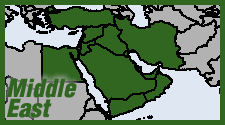 Turkish security forces report that they seized 150 tons of hashish in 2013, with 89 tons seized in southeastern Diyarbakir province, Turkey's Kurdish heartland. Authorities also said a somewhat improbable 56 million cannabis plants had been seized in Diyarbakir, and 382 arrested. The provincial Counter Narcotics Department called it a record-breaking year. (Trend, Jan. 9)
Turkish security forces report that they seized 150 tons of hashish in 2013, with 89 tons seized in southeastern Diyarbakir province, Turkey's Kurdish heartland. Authorities also said a somewhat improbable 56 million cannabis plants had been seized in Diyarbakir, and 382 arrested. The provincial Counter Narcotics Department called it a record-breaking year. (Trend, Jan. 9)
Turkey has long hyped a link between the hashish trade and the Kurdistan Workers Party (PKK), a separatist guerilla movement that has for more than a generation waged an insurgency in the country's east. In March 2013, the imprisoned PKK leader, Abdullah Ocalan, declared an historic ceasefire after months of negotiations with the Turkish government. But in September the PKK announced that they were suspending the truce, accusing the Turkish government of failing to deliver promised reforms guaranteeing Kurdish cultural rights. On Dec. 6, three young Kurds were killed in a clash with police during a protest in Hakkari province. The confrontation was reportedly triggered by claims that the graves of PKK militants had been desecrated. Two days later, PKK militants abducted four Turkish soldiers in Diyarbakir, releasing them the next day following mediation by the pro-Kurdish Peace and Democracy Party (BDP). (Press TV, Jan. 15) So there are good odds that the war in Turkey's east could be back on again.
It isn't only the Turkish state that claims the PKK has funded its insurgency through the hashish trade. A 2002 study by the US Library of Congress Federal Research Division (PDF) found: "The PKK has funded its terrorist activities from a number of illegal enterprises, including the trafficking of narcotics and people, combined with voluntary and forced contributions from the Kurdish diaspora."
But nor was the PKK alone in exploiting the hash trade for clandestine activities—so did their most bitter enemies, the Grey Wolves, a paramilitary network with shadowy ties to the security forces that exacted terror on perceived guerilla collaborators. A 1999 Canadian parliamentary study "Conflict, Drugs and Mafia Activities," also noted PKK involvement in narco-trafficking networks, but added: "The Grey Wolves, an extreme right wing organization which is often used by the army and the political parties for their 'dirty jobs', use the same methods, while enjoying significant protection within the Turkish state."
Note that these studies are both more than 10 years old. The two top global hashish producers are today Morocco and Afghanistan. (Morocco World News, Nov. 12) In the case of Afghanistan, this is clearly linked to the war and illicit drug production fueling each other in a vicious cycle. But with the war in Syria now spilling over into both Turkey and Lebanon, these latter two countries may be poised to regain their market share.
On Jan. 9, Turkish Foreign Minister Ahmet Davutoglu warned of infiltration from across the Syrian border of both al-Qaeda militants and fighters from the Democratic Union Party (PYD), seen as the Syrian branch of the PKK. (Trend, Jan. 9) Davutoglu portrayed them as a unified threat, but in fact the two groups are violently opposed, and have been waging a war for control of Syrian Kurdistan. If this war spills over into Turkish territory, it portends a three-way conflict among the PKK, al-Qaeda and the Turkish state—each, we may be sure, seeking to corner control of the hashish industry.
Cross-post to High Times







Recent comments
3 weeks 3 days ago
3 weeks 4 days ago
6 weeks 4 days ago
7 weeks 4 days ago
11 weeks 4 days ago
15 weeks 2 days ago
19 weeks 3 days ago
20 weeks 1 day ago
30 weeks 1 day ago
34 weeks 1 day ago